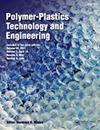增塑剂转化聚(ε-己内酯)微胶囊中阿霉素的包封与释放
Q2 Materials Science
引用次数: 3
摘要
本文报道了增塑剂介导的聚(ε-己内酯)中空颗粒转化成微胶囊,然后通过渐进的方法包封并从微胶囊中缓释阿霉素。增塑剂分子增加了聚合物链的流动性。与1,4-二恶烷和甲苯相比,氯仿是中空颗粒转化为微胶囊的最佳增塑剂。下一步,在氯仿的存在下,抗癌药物阿霉素被包裹在空心颗粒中。在磷酸盐缓冲盐水(pH 7.4)中,药物在体外释放超过15天。图形抽象本文章由计算机程序翻译,如有差异,请以英文原文为准。
Encapsulation and Release of Doxorubicin from Plasticizer-Transformed Poly(ε-Caprolactone) Microcapsules
ABSTRACT The manuscript reports plasticizer-mediated conversion of poly(ε-caprolactone) hollow particles into microcapsules followed by encapsulation and sustained release of doxorubicin from the microcapsules through a progressive approach. Plasticizer molecules account for increased mobility of polymer chains. Chloroform was observed to be the best plasticizer for potential transformation of the hollow particles into microcapsules, compared to 1,4-dioxane, and toluene. In the next step, an anticancer drug doxorubicin was encapsulated in the hollow particles in presence of chloroform. In vitro release of drug from the microcapsules in phosphate buffer saline (pH 7.4) demonstrated sustained release pattern over 15 days. GRAPHICAL ABSTRACT
求助全文
通过发布文献求助,成功后即可免费获取论文全文。
去求助
来源期刊

Polymer-Plastics Technology and Engineering
工程技术-高分子科学
CiteScore
1.71
自引率
0.00%
发文量
0
审稿时长
4 months
 求助内容:
求助内容: 应助结果提醒方式:
应助结果提醒方式:


